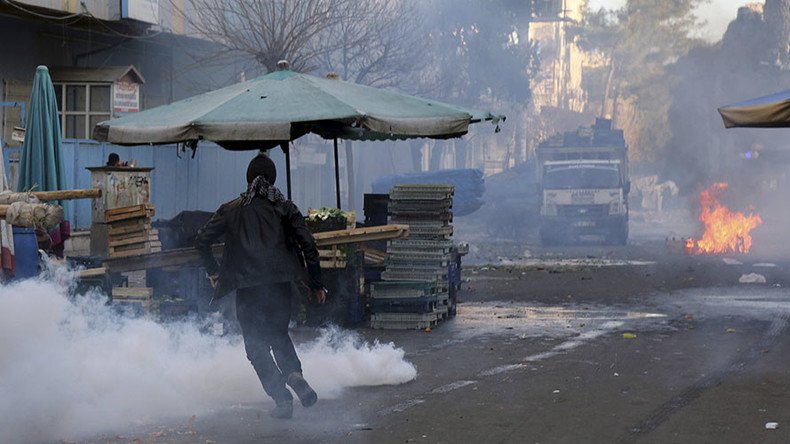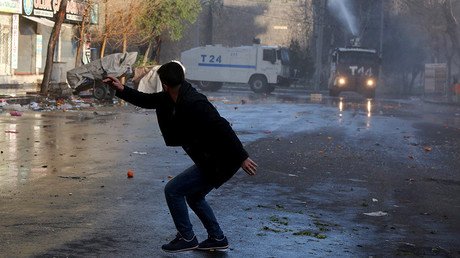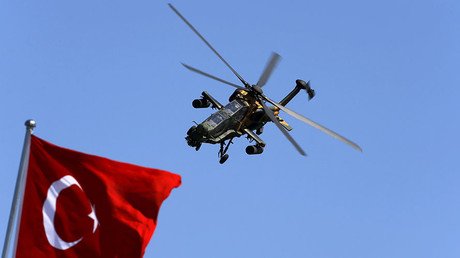Tough Turkey: ‘Kurds fighting for their rights labeled as terrorists’

The Turkish government has an upper hand against the Kurds, who struggle not only for independence, but for autonomy and recognition of their rights within the Turkish state, Professor of social and political history Ronald Suny told RT.
Turkey intensified a crackdown against Kurdish militants in recent weeks following a PKK terror attack in Ankara that killed 28 people. Turkish authorities insist all those killed during police raids are terrorists from the Kurdistan Workers party [PKK.] There have also been several reports that Iraqi Kurds have shot down a helicopter which they claim had been used in air strikes against them.
RT: Turkey seems determined to proceed with its military crackdown despite the outcry from rights groups. Do you think they will admit they killed thousands of civilians?
Ronald Suny: I doubt that very much. The fact is that at the moment all over the world, and in Turkey particularly right now, the word ‘terrorist’ has become meaningless – that is, anyone who resists oppression, occupation they are being called ‘terrorists’ nowadays. The people who have been fighting or defending their towns in Diyarbakir, in Cizre have been fighting for autonomy, for some rights. In Kurdistan, that is, in Eastern Turkey, it is impossible for a Kurdish child to be educated in a state school in the Kurdish language. We’re talking about 15 million or more people who cannot study in their own language. This is clearly oppression, it is against national self-determination, and it is extremely reprehensible what the Turkish government has decided to do against its own Kurdish citizens.
RT: We've seen pictures from the areas under curfew and they literally look like Syria at the moment. How come such heavy military operations are being allowed in residential areas?
RS: I think this is really reprehensible. The level of warfare in these internal conflicts is going to new degrees of obscenity, it seems to me: bombing from the air civilian populations in cities where they have really no escape, or in the case of the Cizre, surrounding the town with tanks, shelling the civilians, and the people who are defending the towns, of course they are called ‘militants, terrorists’ or whatever. Sniping from rooftops on people who go out to help other people who have been wounded. These kinds of things have become daily occurrences.
It seems at the moment in Cizre the fighting has stopped, the Turkish army has taken over the city. As you saw in Diyarbakir, demonstrations to try to protest what has been going on have also been broken up. So at the very moment it seems that the Turkish government and armed forces have the upper hand in what is essentially a struggle by the Kurds – not for independence, so much - as for some autonomy, some recognition of their existence of their rights within the Turkish state.
This generation of Kurds will never go down on their knees
The image Turkey wants to give to the world, especially to the Kurds, is that they cannot be beaten, the Kurds should submit to them, Kani Xulam of the American Kurdish Information Network, told RT.
RT: If such an incident took place why do you think the Turkish government is staying quiet about it?
Kani Xulam: Well, the Turkish government would like to portray itself as invincible, as a power that cannot be beaten. Throughout the conflict with the Kurds, scores of Turkish soldiers were taken prisoners and the Turkish government would not even acknowledge them for long periods of time. And when there were peace talks these soldiers would be released.
About the helicopter incident – in the Turkish media there is no reference to it, but there are some references now in some of the Kurdish dailies about it. But the image Turkey wants to give to the world, especially to the Kurds, is that they cannot be beaten; the Kurds should submit to them, go down on their knees. But this generation of Kurds is not about going down on their knees, they want to fight back, they want to get their rights.
RT: Turkey has been targeting Kurdish forces in many areas outside the country. Why does it feel entitled to conduct such operations on another states' territory?
KH: The problem is the Kurds live in Syria, in Iraq, in Turkey and in Iran. For a long time these countries, even if they didn’t go along on a lot of issues, they will go along on the Kurdish issue. When [Saddam] Hussein was in power, for example, Turkey had a green light, if you will. It could fly into Iraqi Kurdistan and fight the Kurds [Turkish Kurds] at will. With the advent of the Arab Spring things have changed. Any time now, for example, Turkey attacks Kurdish positions inside Iraq, the Arab League condemns it, the Baghdad government condemns it. Turkish–Syrian relations are not good now. So anytime Turkey wants to attack the Kurds inside Syria, the Syrian government condemns it. Their relations lately have become soured, but for a long time they were good. The good part was that the common denominator was that they all didn’t like the Kurds and they wanted the Kurds not to prosper.
The statements, views and opinions expressed in this column are solely those of the author and do not necessarily represent those of RT.














